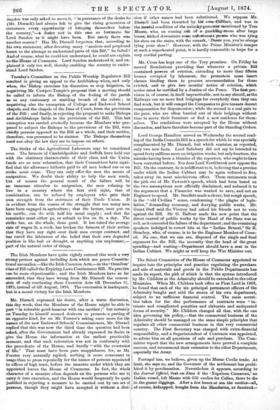Lord George Hamilton moved on Wednesday the second read- ing
of the India Councils Bill in a speech for which he was specially complimented by Mr. Disraeli, but which contains, as reported, only two new facts. Lord Salisbury did not say he intended to spend forty millions more on irrigation works, but only knuteen , the mistake having been a blunder of the reporters, who ought totave been corrected before. Nor does Lord Northbrook now oppose the Bill. On the contrary, he is indifferent to it, believing that a proviso under which the Indian Cabinet may be again reduced to five, takes away its most mischievous effect. These statements took the pith out of Mr. Fawcett's speech, which had been based on the two assumptions now officially disclaimed, and reduced it to the argument that a Financier was wanted to save, and not an Engineer to spend. Mr. Smollett made a clever, but rough speech, in the "old Civilian" sense, condemning "the plague of legis- lation," demanding economy, and decrying public works. Mr. Grant Duff said the Viceroy had asked his friends not to vote against the Bill. Sir G. Balfour made the new point that the direct control of public works by the Head of the State was an evil, as it concealed the failure of the department; and the remaining speakers indulged in covert hits at the "Indian Brunel," Sir R. Strachey, Who, of course, is to be the Engineer Member of Cowl- cll. No one, that we can see, disposed of the single and final argument for the Bill, the necessity that the head of the great spending—and wasting—Department should have a seat in the Indian Cabinet. We might as well keep the War Minister out.






























 Previous page
Previous page